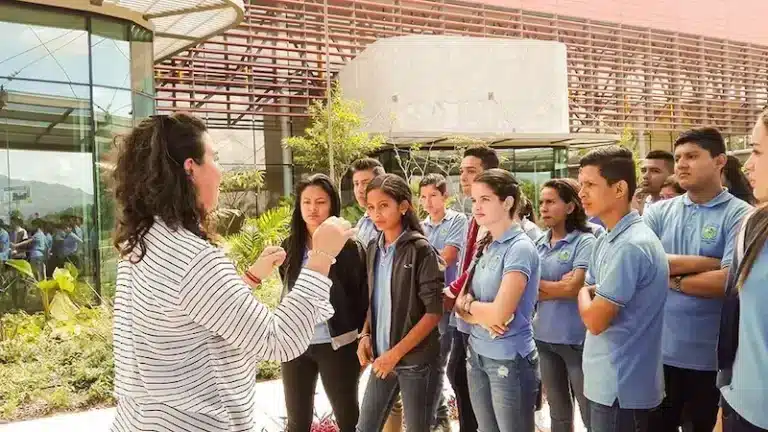Have you ever wondered what is behind a good plate of food that arrives at your table?
Well, behind a good dinner there are countless factors that are directly related to sustainability. It’s not just about good cooking, but about understanding where the ingredients come from, how they are grown, how they are marketed and how they are prepared.
That is what sustainable gastronomy is all about, preparing food with the awareness that this implies, bearing in mind issues such as waste reduction, rational use of resources, sustainable production, promotion of seasonal products and good understanding between producers and consumers.
Here we tell you what the trends for sustainable events in terms of gastronomy are thought in a sustainable way.
What is sustainable gastronomy?
The origin of sustainable gastronomy comes from the declaration of the United Nations (UN), which states that “sustainable gastronomy refers to the promotion of the natural and cultural diversity of the planet, in addition to the promotion and encouragement of environmentally responsible food consumption”.
Other definitions describe it as the way in which balance is maintained in ecosystems, through sustainable practices in the production and consumption of food, which are also typical of each region to promote the local economy.
The United Nations Educational, Scientific and Cultural Organization (UNESCO) promotes initiatives such as the Creative Cities Network, which shares best practices and collaborations in seven creative fields; the use of clean energy in restaurants (use of gas, electricity, or natural gas instead of coal); and communication to the world about the benefits of sustainable gastronomy.
The Food and Agriculture Organization (FAO), for its part, promotes ecological, healthy and sustainable diets in different countries around the world.
As with everything that has to do with sustainability, there are three points that cannot be lost sight of: environmental, social, and economic.
Hence, the importance of sustainable gastronomy lies in practices such as buying local and seasonal, planning menus, minimizing food waste, saving water, recycling, and generating less plastic, and introducing more and more organic products.
When is Sustainable Gastronomy Day celebrated?
It was the United Nations General Assembly that proclaimed June 18 as the International Day of Sustainable Gastronomy with the intention of recognizing gastronomy as a cultural expression of the world’s natural and cultural diversity. This also points to the use of seasonal ingredients and products, as well as the preservation of wildlife and culinary traditions.
In 2022 the Food and Agriculture Organization of the United Nations (FAO) stated that: “Sustainable gastronomy plays a key role in sustainable development. It promotes agricultural development, food security, nutrition, sustainable food production, responsible consumption, and biodiversity conservation”.
This is an important date for many reasons, such as, for example, the fact that, according to FAO data, one third of all food produced is wasted in the world; or that it is predicted that by 2050 there will be a need to feed nearly 9 billion people in the world.
Not for nothing is it recommended to consume local and sustainably produced food. “Because by buying seasonal products we help local businesses to reduce greenhouse gases and the resources used to transport food,” says the institution.
How to have a sustainable kitchen?
Here are 10 tips to join the good practices of responsible gastronomy, or to demand it in your events to those who hire gastronomic services, if it is the case.
-
Save energy:
By cooking with pans and pots of a size proportional to the food you intend to prepare, also using utensils that help to cook faster such as the express cooker.
-
Avoid waste:
For this, the ideal is to buy only what is necessary for the week or specific event and use leftover fruit, bread, meat, vegetables to cook other dishes.
-
Reduce consumption of meat and fish:
by doing so, you not only contribute to the care of the environment, but it is also healthy. To start with, if you have not made a definite decision to give up these foods, it is recommended to leave them aside once a week.
-
Consuming local:
by consuming seasonal products from the same region, you are consuming more nutrients and supporting local agriculture, which contributes to economic growth.
-
Substitute the use of plastic:
materials such as clay, wood, aluminium, pewter or glass are better options in the kitchen that actually last longer.
-
Reduce and reuse water:
for this, the use of water filters, atomizers for faucets and dishwashers are advised. But if you do not have these elements, at least have the option of reusing water in other domestic tasks.
-
Prefer cloth napkins:
cloth napkins do not generate waste as paper ones do. There is also the option of having biodegradable paper napkins.
-
Minimize the use of household appliances:
if possible, the idea is to prepare that do not involve the use of electrical appliances and thus reduce electricity consumption.
-
Have your own vegetable garden:
it is possible to make a home vegetable garden with different food waste. To do so, all that is required is a container with a layer of straw, garden waste, food waste and watering with water.
- Do not throw the oil in the dishwasher:
this can greatly contaminate the water or cause clogging in the pipes. Leftover oil can be put to other uses.
Sustainable gastronomy at the Costa Rica Convention Center
According to a study by the University of Costa Rica, in this country efforts to develop this type of gastronomy were concerted in the National Plan for Sustainable and Healthy Costa Rican Gastronomy created in 2014.
Two years later, this university, through the School of Nutrition, adhered to said plan and promotes it in conjunction with the Costa Rican Chamber of Restaurants and 50 other organizations in this country.
“In recent times, the importance of linking people’s food practices with culture, the environment and sustainability has become evident, hence a more comprehensive view of gastronomy as a set of knowledge and practices aimed at deepening the ingredients or food resources, their maximum use, preparation techniques, moments of consumption and nutrition,” says Patricia Sedó Masis, M.Sc. nutritionist of this institution.
And undoubtedly, tourism in Costa Rica promotes local and economic development, as well as sustainable gastronomic practices that are already part of our culture.
More and more restaurants, bars, lodging services and event venues are applying the good practices of sustainable gastronomy, by using local ingredients in their menus, making fresher food combinations, buying from local farmers, among other issues.
This is the case of the Costa Rica Convention Center, a place accredited as a Safe Kitchen that uses one hundred percent natural products, innovative local and international techniques for the preparation and presentation of its dishes, and a first-class kitchen.
In this place, both organizers and guests will live a memorable experience that is designed from the design of the menu, through a wide variety of options, to the experience of a commitment to sustainability that is breathed with every bite.






